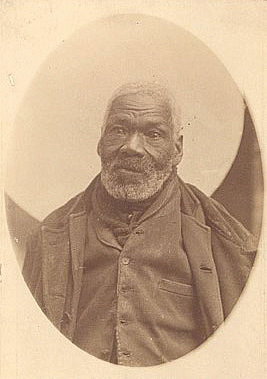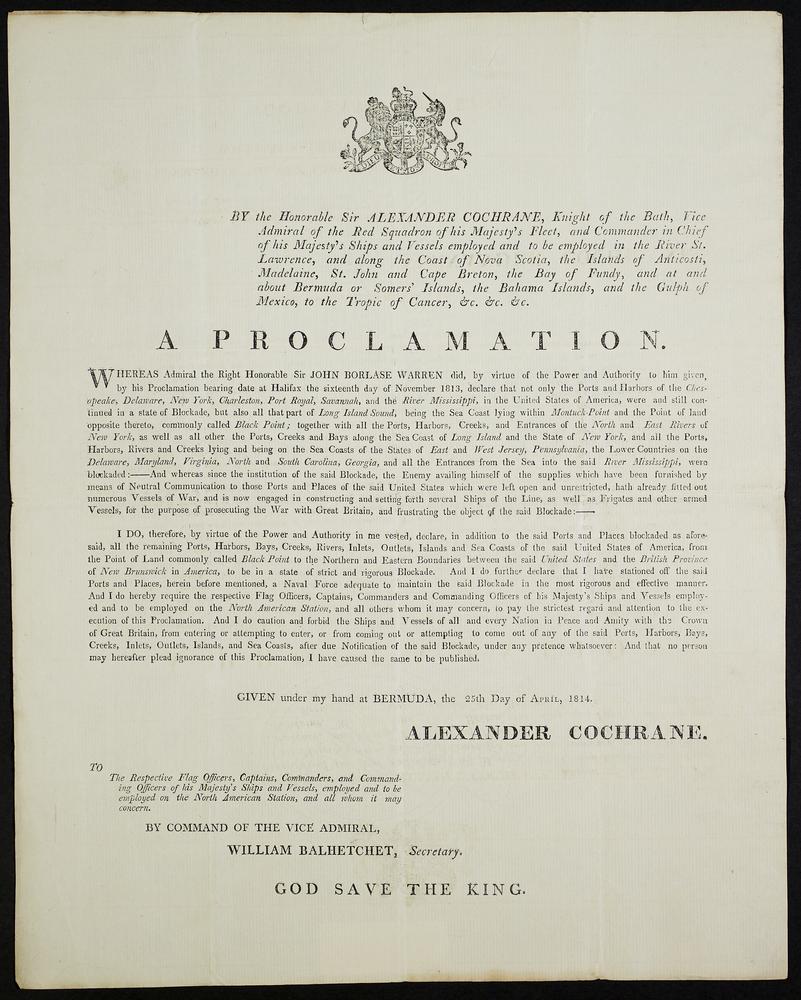On April 2 1814, Vice-Admiral Alexander Cochrane issued a proclamation to attract black recruits from the men held in slavery on farms and plantations across the Chesapeake region. The proclamation was intended to help fulfill his plans (mentioned in his March 10 letter to George Prevost) to combine the “Recruits I expect to raise from the Negroes” with the British Marines and “Keep the Enemy in a constant alarm.”
In The Internal Enemy: Slavery and War in Virginia, 1772-1832, historian Alan Taylor observed how the carefully worded proclamation avoided any direct mention of slavery but still emphasized the “FREE” status of any who fled to the British–allowing Cochrane to deny any charge of promoting a slave revolt. Cochrane sent 1,000 printed copies of the proclamation to Cockburn for distribution around the Chesapeake, an effort aided by local and national newspapers that reprinted the proclamation in full. Taylor quotes orders from Cochrane to Taylor identifying the emancipation of enslaved people as a central goal of the 1814 campaign writing:

“Let the Landings you may make be more for the protection of the desertion of the Black population than with a view to any other advantage… The great point to be attained is the cordial support of the Black population. With them properly armed & backed with 20,000 British Troops, Mr. Maddison will be hurled from his throne.”
Many of the black recruits and families that took advantage of the British offer were eventually resettled in Halifax, Nova Scotia. According to Taylor, around 1,200 black refugees arrived between 1813 and 1814 and another 1,611 refugees arrived between April 1815 and October 1818. Among the enslaved people from the Chesapeake who made it to Canada was thirteen-year-old Gabriel Hall (pictured above in an 1895 photograph) who escaped from Walter Wells’s Calvert County farm in July 1814. Learn more about Gabriel Hall from the Maryland State Archives or read on for a transcript of Cochrane’s proclamation.

PROCLAMATION OF VICE ADMIRAL SIR ALEXANDER F.I. COCHRANE, R.N.
By the Honorable Sir ALEXANDER COCHRANE, K.B. Vice Admiral of the Red, and Commander in Chief of His Majesty’s Ships and Vessels, upon the North American Station …. &c, &c, &c.
A PROCLAMATION.
WHEREAS, it has been represented to me, that many Persons now resident in the UNITED STATES, have expressed a desire to withdraw therefrom, with a view of entering into His Majesty’s Service, or of being received as Free Settlers into some of His Majesty’s Colonies.
This is therefore to Give Notice,
That all those who may be disposed to emigrate from the UNITED STATES will, with their Families, be received on board His Majesty’s Ships or Vessels of War, or at the Military Posts that may be established, upon or near the Coast of the UNITED STATES, when they will have their choice of either entering into His Majesty’s Sea or Land Forces, or of being sent as FREE settlers to the British Possessions in North America or the West Indies, where they will meet with due encouragement.
Given under my Hand at Bermuda, this 2nd day of April, 1814, ALEXANDER COCHRANE.
By Command of the Vice Admiral, WILLIAM BALHETCHET. GOD SAVE THE KING.